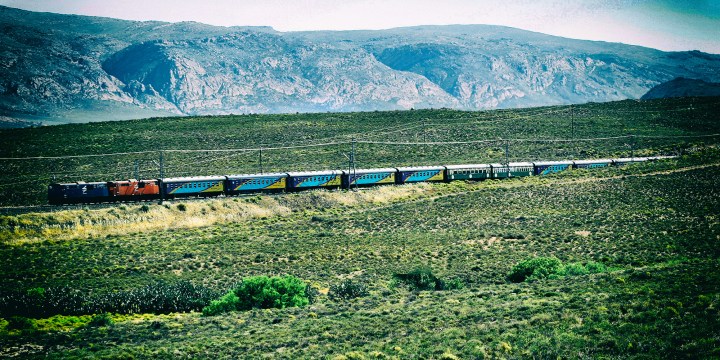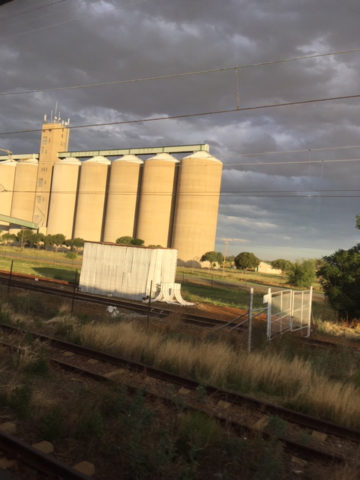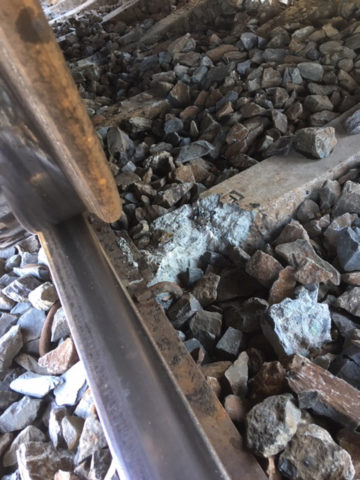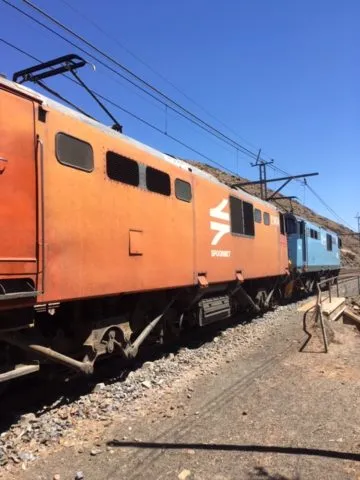A REFLECTION
An insider’s view: An extra-long long-distance trip on the Shosholoza Meyl

It is no surprise that the Shosholoza Meyl long-distance train service has been stopped in its tracks amid safety and other concerns. A recent trip from Joburg to Cape Town that should have taken 26 hours ended up being a stop-start 35-hour trip, while at the same time revealing some of the decay within the services operated by the Passenger Rail Agency of SA.
Travelling by train should be fun. First, there’s the low, flatulent growl of the diesel locomotive engines, the opening credits of any long-distance journey, and after that, the climbing aboard with your luggage, invariably followed by the mandatory bounce (or two) on the seats.
While you wait for the train to ease out of the station, you might walk the platform or count the coaches, or indulge in a friendly give-and-take with the engine driver, who allows you to come aboard and tells you that his run takes the Shosholoza Meyl down to Bloemhof.

Bloemhof. (Photo: supplied)
To while away the time, you might even latch down one of the top bunks and climb on, flicking the reading lights on and off to see that everything is working.
When I was a boy, growing up in the apartheid-era 1970s, South African Railways bunks used to be covered in green leather, the colour of watery pea soup. Bedding matters were taken seriously, as all railway activities were, and on all long-distance journeys, there was a bedding officer who wore a khaki suit he had clearly inherited from someone far larger.
Shortly after you left Park Station on your way to the Cape – at, say, Maraisburg or Westonaria – he rapped briskly on the metal frame of your cabin door with a little steel key.
“Bedding,” he’d announce, the word hovering between statement and question.
When you looked at him blankly, he would ask the question again, except this time round more forcefully. By then, you knew what he meant, and you’d say, “Two, please”, and he would take heavily-starched sheets – presumably designed for hospitals whose patients were never meant to get out of bed – and two thick blue blankets out of a blue duffel bag.
With practised dexterity, he’d spread them upon your bunk as he made your bed. After he left in his too-large khaki suit, you’d hear the rasp of his metal key as he asked – in a sort-of statement – if those in the cabin two along would like bedding and, looking up from your game of patience (for what was a long train journey but a game of patience?), you would see a khaki blur as he shuttled up the carriage to haul more bedding out of a special cupboard at the end of the carriage only he had the key for.
On my latest train journey on the Shosholoza Meyl from Joburg to Cape Town in late November 2019 – at R650 a ticket – I slept underneath a kikoi and regretted it, waking up in the middle of the Karoo badly in need of one of those old-fashioned blue blankets.
There was much on this Shosholoza Meyl trip that left one hankering for things the service didn’t have. Or didn’t consider integral to the experience. Or the Prasa bean-counters had blithely put a line through on their Excel spreadsheets.
Coffee came in polystyrene cups. The toasted sandwiches were made with slices of something that was only nominally white bread. Even the bedding man in his big suit had vanished into the ether of our yesterdays.
Strangest of all, we kept stopping. Not at stations, mind you, but between stations, as though a station might materialise out of the veld because we stopped there. None did, but this didn’t prevent us from stuttering through the West Rand and out through the North-West and across the bleached badlands of the Northern Cape.
It was as though this was a game-viewing train and there was a pride of lions just passing out of sight, or an elephant browsing amiably in the middle distance. Look hard enough and we would see it.
I was on the Shosholoza Meyl with my 83-year-old dad. A couple of days before boarding the train, I’d flown up to Joburg from Cape Town to help him with the last of his packing because he was relocating to a flat in Muizenberg. He had a new girlfriend and was heading down to the Cape for a life of unbridled hedonism, for the almond croissants and bracing sea breezes. Maybe he’d start to surf?
Our journey was meant to be fun. And when it wasn’t fun, it was meant to be a little drunk and when it was neither, it might even have become serious in ways I hadn’t bargained for.
We might have reminisced about my late mother, Cecily, who loved her train journeys. And we might, because of the mind-numbing shoddiness of the current service, have spoken with guilty wistfulness about the old days, when the bedding officer did a fine job and you could eat a decent meal in the dining-room car. Being the apartheid-era with segregated facilities, it was certainly not a better age, we know that, but nostalgia is a seductive mistress, and, hey, the trains ran on time.
We’d left Park Station – a bedraggled, dirty Park Station, pillaged of fuse box covers – at lunchtime on a Friday, reaching Kimberley late that night. It was only when we’d failed to arrive at Beaufort West by eight the following morning that I began to realise something was wrong.
We were travelling too slowly and the arbitrary stopping in the middle of nowhere hadn’t stopped. By lunch-time, we had crept down to Laingsburg, where we stopped again.
There is something about stopping in Laingsburg on a Saturday in mid-summer that seems appropriate. Laingsburg itself is a place that appears to have stopped, which perhaps accounts for why those who pass through on the national road appear to be so fearful of stopping on its dusty streets for too long.
They instinctively understand that stopping briefly is a possible prelude to stopping for longer which, in turn, is a prelude to dreadful ennui and, finally, paralysis. The best way to approach stopping in Laingsburg might indeed be to pass through without looking.

Chipped concrete sleepers at Laingsburg station. (Photo: supplied)
At Laingsburg, our Shosholoza Meyl passengers got out of the train to head off to find water and soft drinks, douse their thirst, find shade and stop. With nothing better to do, I jumped on to the track and examined it. The lines were resting on chipped concrete sleepers, the sleepers sometimes sagging on their beds of stones. I took photos with my smartphone. Our locos were old and sooty. A goods wagon, I noticed, had yawed off the track and was now lying in a donga like a dead donkey.
“This is an accident waiting to happen,” I reported back to my tetchy father in our hot compartment. “Then the service really will stop.”
He smiled weakly.
Later in Laingsburg, I struck up a conversation with the group of young policemen who had accompanied us from Joburg. I thought at first they were being redeployed, but crime – muggings, drug running – was rife on the route and they were there to protect us. They were lekker fris mannetjies these young policemen, but they were looking at their cellphones so intently that their carriage could have been uncoupled from the main train and they’d have been none the wiser.

The put-upon Shosholoza Meyl diesel locomotives. (Photo: supplied)
Eventually, we were given the all-clear to fire up those put-upon diesels and head down the line. We crawled through the Karoo (a landscape that had stopped – millions of years ago), pulling up briefly at Matjiesfontein and De Doorns.
At Worcester, we were told by a sweaty official with a walkie-talkie in his hand that a bus to Cape Town could be arranged. This was the moment we’d been waiting for. It was now or never. We were already three hours late and the train was stopping at not only its scheduled stops, but at some peculiar ones too.
We looked at each other like gunslingers in a spaghetti Western.
“We’ll hang in there,” we said.
After Worcester (or was it before?) we were stopped in our tracks – proverbially speaking – by the arrival of curry which, this being contemporary South Africa, I can only understand as a friendly bribe. It came out of nowhere, miraculously, arriving in polystyrene tubs.
It was surprisingly good. We wolfed it down faster than you could say “express train”. Was there any more, I could hear us both thinking, but the curry was long gone, like our prospects of arriving in Cape Town on time.
After Worcester, we discovered the Cape Winelands. Do you know there’s a station close to Wellington called Hugenote? We stopped there. And finally – at midnight – we stopped at Cape Town station, nine hours late, with just the echoing silence for company.
In mid-February 2020, the accident I sensed was about to happen in Laingsburg in November 2019 happened in Horison on the West Rand. The Shosholoza Meyl, travelling at 60km/h, collided with a goods train full of containers moving in the same direction at a slower speed.
One overseas tourist died, one passenger was critically injured and eight sustained minor injuries. The accident happened in almost complete darkness at 9:35pm on a Wednesday.
As a result of the accident, the Railway Safety Regulator (RSR) has prohibited the Shosholoza Meyl from running any further services. When asked when this was likely to be lifted, the RSR’s chief operation’s officer (acting), Freddie Kgomari, said he wasn’t sure.
A talkative man, in an interview, Kgomari gave me the impression that as the regulator, he is in the invidious position of regulating that which cannot be regulated.
“Signalling cables are stolen from the boxes all the time,” he said, “and vandalism across the network is a real issue.” Which is perhaps why surfer boy and I took 35 hours to get to Cape Town instead of the scheduled 26. DM
















 Become an Insider
Become an Insider